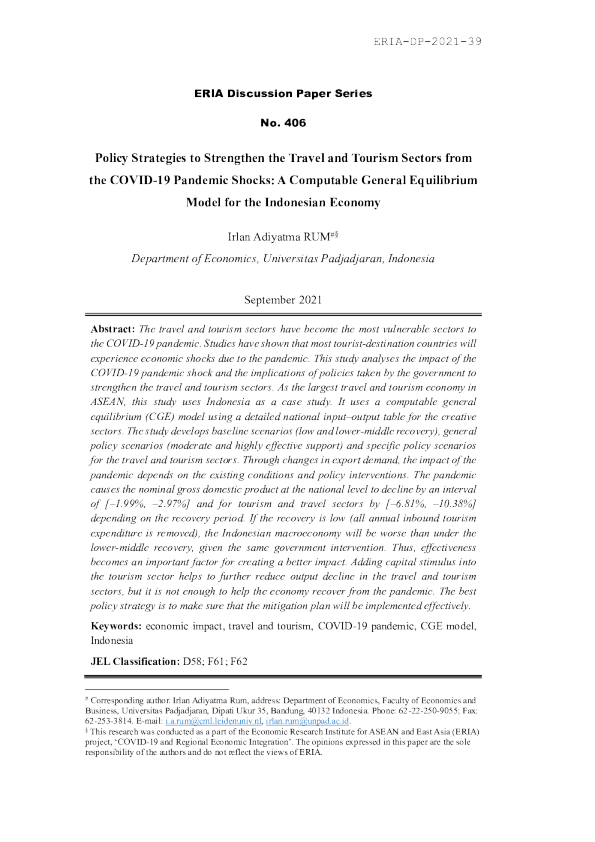埃塞俄比亚碳税的分配效应:可计算的一般均衡分析(英)
 AI智能总结
AI智能总结
PublicDisclosureAuthorized PublicDisclosureAuthorized PolicyResearchWorkingPaper10476 DistributionalEffectsofCarbonTaxinEthiopia AComputableGeneralEquilibriumAnalysis GovindaR.TimilsinaSamuelSebsibie DevelopmentEconomicsDevelopmentResearchGroupJune2023 PolicyResearchWorkingPaper10476 Abstract Developingcountriesareincreasinglygivingattentiontocarbonpricingtoreducetheiremissions,particularlyinmeetingtheirnationallydeterminedcontributionundertheParisClimateAgreement.However,theywouldliketounderstandthepotentialeconomic,distributional,andenvironmentalimpactsofcarbonpricingpoliciesbeforetheyconsiderimplementation.UsingacomputablegeneralequilibriummodelofEthiopia,thisstudyexaminestheeffectsofahypotheticalcarbontax(US$20/totalcarbondioxide)underseveralalternativeschemestorecyclecarbontaxrevenuetotheeconomy.Thestudyfindsthatacarbon taxwouldberegressiveinallschemesconsideredexceptthosewhenthetaxrevenueisrecycled,asacashtransfer,tohouseholdincomegroupseitherequallyorinverselyproportionaltotheirincomes.Theschemesthatmakethecarbontaxprogressivealsocauseahigherreductionofcarbondioxideemissions,therebyensuringthealignmentofequityandenvironmentaloutcomesofthecarbontax.However,theseschemesarenotnecessarilyeconomicallyefficientbecausetheycausehigherreductionsofgrossdomesticproductcomparedtootheroptionsconsidered. ThispaperisaproductoftheDevelopmentResearchGroup,DevelopmentEconomics.ItispartofalargereffortbytheWorldBanktoprovideopenaccesstoitsresearchandmakeacontributiontodevelopmentpolicydiscussionsaroundtheworld.PolicyResearchWorkingPapersarealsopostedontheWebathttp://www.worldbank.org/prwp.Theauthorsmaybecontactedatgtimilsina@worldbank.org. ThePolicyResearchWorkingPaperSeriesdisseminatesthefindingsofworkinprogresstoencouragetheexchangeofideasaboutdevelopmentissues.Anobjectiveoftheseriesistogetthefindingsoutquickly,evenifthepresentationsarelessthanfullypolished.Thepaperscarrythenamesoftheauthorsandshouldbecitedaccordingly.Thefindings,interpretations,andconclusionsexpressedinthispaperareentirelythoseoftheauthors.TheydonotnecessarilyrepresenttheviewsoftheInternationalBankforReconstructionandDevelopment/WorldBankanditsaffiliatedorganizations,orthoseoftheExecutiveDirectorsoftheWorldBankorthegovernmentstheyrepresent. ProducedbytheResearchSupportTeam DistributionalEffectsofCarbonTaxinEthiopia:AComputableGeneralEquilibriumAnalysis1 GovindaR.TimilsinaandSamuelSebsibie2 KeyWorlds:Climatechange,Carbontax,Generalequilibriummodel,Distributionalimpacts,Ethiopia JELClassification:C68,Q43 1TheauthorswouldliketothankYazidDissou,SalonyRajbhandari,CarolynFischerandWorldBankEthiopiaCountryOfficefortheirvaluablecommentsandsuggestions.TheviewsandinterpretationsareofauthorsandshouldnotbeattributedtotheWorldBankGroupandtheorganizationstheyareaffiliatedwith.WeacknowledgeWorldBank’sResearchSupportGrant(RSB)forfinancialsupport. 2GovindaTimilsina(gtimilsina@worldbank.org)isaSeniorEconomistattheDevelopmentResearchGroup,WorldBank.SamuelKebede(ssebsibie@gmail.com)wasaShort-termConsultanttotheWorldBankduringtheimplementationthisstudy. DistributionalEffectsofCarbonTaxinEthiopia:AComputableGeneralEquilibriumAnalysis 1.Introduction EthiopiaisalandlockedcountrylocatedinSub-SaharanAfrica.Whilethecountryisclassifiedasalow-incomeeconomybytheWorldBank,withapercapitaincomeoflessthanUS$1,085in2021,3itwasoneofthefastest-growingeconomiesinthelastdecade(2010-2020).Itachievedthehighesteconomicgrowthintheworld,onaverage,9.3%peryearduringthe2010-2020period(WorldBank,2022).TheeconomicgrowthwasalsoaccompaniedbytherapidincreaseinCO2emissionsfromfuelconsumption,12%peryear,onaverage(WorldBank,2022).ConsideringtherapidgrowthofCO2emissionsalongwithitseconomy,EthiopiahascommitteditsNationallyDeterminedContributionundertheParisClimateAgreementtolimititsgreenhousegas(GHG)emissionsby68.8%belowthebusiness-as-usualsituationin2030(FDRE,2021). Carbonpricinginstruments,suchascarbontax,couldbeeconomicallyefficientforreducingGHGemissions(seee.g.,Aldyetal.2010;Timilsina,2022;Timilsinaetal.2022).Morethan120countries,includingdevelopingcountries,haveconsideredcarbonpricingasoneofthepolicyoptionstoachievetheirNDCtargets(WorldBank,2023).However,mostcountriesdonotknowhowthesepolicieswillimpacttheireconomyandthepopulation.Aslow-incomehouseholds’expenditureshareonenergycommoditiesislikelytobehigherthanthatofhigh-incomehouseholds,theburdenofenergypriceincreasesresultingfromacarbontaxmightfallonthemdisproportionally(see,e.g.,Ohlendorfetal.2021;Williamsetal.2015;Rauschetal.2011).InthecaseoftheUnitedStates,Rauschetal.(2011)findthatacarbonpricingpolicyisregressive.Throughameta-analysis,Ohlendorfetal.(2021)reportthatthedistributionalimpactsofcarbonpricingareheterogeneousacrosscountriesdependingontheireconomicstructuresandtheenergysupplymixes. Theregressiveeconomicimpactsofacarbontaxarepoliticallysensitive.Developingcountriesmightbeinterestedinacarbontaxifitcanbedesignedinsuchawaythatitisprogressiveandwelfare-improving.Someexistingstudiesinvestigatesituationswhenacarbontaxcouldbemadeprogressive.




